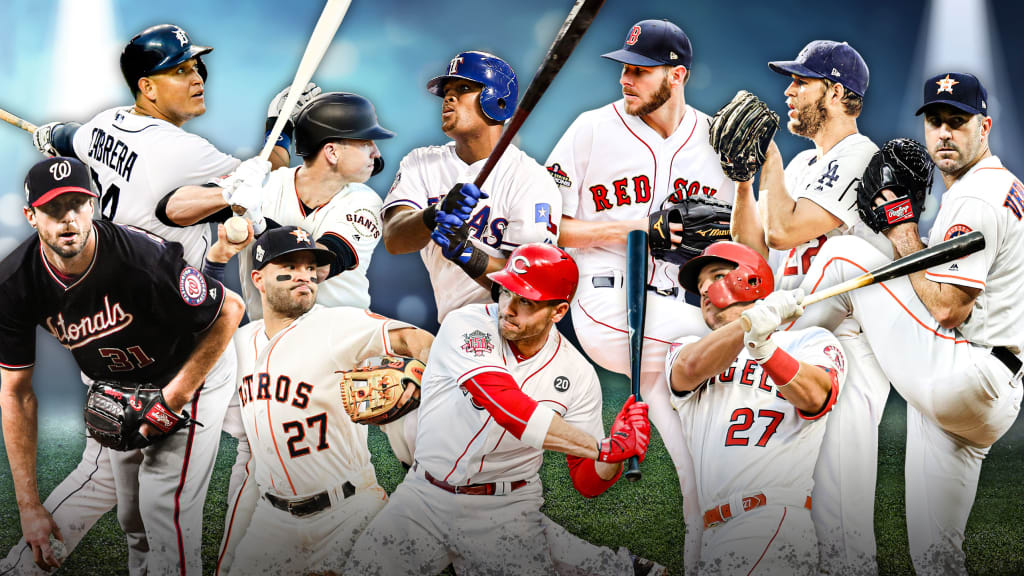
Will Leitch’s series on the Data Decade, closing out this remarkable period in baseball history, runs every other week. Today we look at the 10 best individual players from 2010-19.
According to Baseball-Reference WAR, Babe Ruth was the 11th best player of the 1910s, particularly impressive considering his career did not start until 1914. (It did help that he had 20.6 WAR as a pitcher and 19.3 WAR as a hitter.) He was also the 17th best player of the 1930s, even though he only played five years that decade as well. And of course during the 1920s, he might have been the most dominant player who ever lived.
This is to say: To make an all-decade team, to be one of the best players of a certain decade, requires some help from timing. But if you’re truly transcendent, you can be eternal. In this series, we’ve looked at the best player at each position. But today we go for the full enchilada: The best players from 2010-19. The ones we’ll always associate with this decade. These are the players we’ll never forget.
1. Mike Trout, CF
So, where do you start? The three American League MVP Awards? (And he arguably could have won seven.) The seven Silver Slugger Awards? The eight All-Star Games? I’ll go with this: Mike Trout didn’t play a full season until two years of this decade were already over. And there’s still no player within 13 WAR of him. He’s going to be on the next decade’s best players list.
2. Clayton Kershaw, LHP
Kershaw was only 21 years old when the decade dawned, which is remarkable even before you consider the fact that he already had two seasons and 51 starts under his belt. He was excellent in 2010, but the Hall of Fame run began the next season, the first of four consecutive ERA titles he’d win. (And the first of his three National League Cy Young Awards.) He has never made fewer than 21 starts in a season—and only fewer than 26 once—and threw more than 198 innings six times. He is, somehow, still only 31 years old. It is perhaps telling, by the way, that of the top two players on this list, the only thing that evaded them this decade was a World Series title (or in Trout’s case, a postseason win of any kind).
3. Justin Verlander, RHP
If Verlander’s career had petered out in 2014 or '15, like it briefly looked like it might, he still might have found a place on the bottom of this list. (He did win an MVP, after all.) But the finishing kick of the last half of the decade, particularly after being traded to Houston, secured not just his place among the best players on earth but almost assuredly a spot in the Hall of Fame. Amazing stat: His ERA after three years in Houston is lower than any of his single-season ERAs in Detroit except for one. And unlike the men above him on this list, he has a World Series ring.
4. Max Scherzer, RHP
The 2010 season was the first year of Scherzer’s career in which he had a winning record, and '13 was the first year he had an ERA under 4.00. But he was building toward the pitcher he would become, one who would somehow grow stronger and stronger as the decade went on. No pitcher better represented the strikeout era this decade would be marked by, and in many ways, his intense glare on the mound will be one of the lasting images of this whole era. His free-agent contract with the Nationals ended up being one of the smartest ones given out. And he’s not done: After all, 2019 was the seventh straight season he ended the year in the top five of Cy Young Award voting.
5. Joey Votto, 1B
Has there been a more underappreciated superstar over the last 30 years than Joey Votto? Even by his own fan base? Votto, better than anyone this whole decade, did the one thing that makes you most valuable to your team as a hitter: He did not make outs. His .428 OBP for the decade is far and away the best in baseball. That decade-long figure is better than Ken Griffey Jr. had in any single season. Votto's best season was the decade’s first, when he had 37 homers and won the NL MVP Award, but until 2019, he was so remarkably consistent that his brilliance was easy to miss. We should be debating Votto’s Hall of Fame case much more than we are.
6. Adrián Beltré, 3B
Heading into the decade, Beltre, already 31, was considered a talented but still somewhat disappointing player, someone who was solid and dependable but didn’t live up to the contract he signed with the Mariners in 2005. (Remember, he had to take a pay cut when he signed with the Red Sox in '10.) That season ended up being the first of four All-Star seasons this decade, the one where he assured himself a spot in Cooperstown. He’s also as likable of a player as you’ll find in the game, and honestly it just hasn’t been quite as fun since he retired.
7. Miguel Cabrera, 1B
In many ways, the fact that Cabrera is still playing, rather than having retired and thus just living in our memory, hurts him in retrospectives like this. After all, he looks nothing like that player who once dominated opposing pitchers. But that shouldn’t make us forget just how incredible he was. He won an AL MVP Award with a Triple Crown season in 2012, and then he won another MVP the next year with a season that was even better. The falloff has been steep the last couple of years, but he still might have been the Tigers’ best hitter at the end of this past season. That contract will keep him going through 2023, at least, but just because he’s getting further and further away from his amazing peak doesn’t make that peak any less amazing.
8. Buster Posey, C
When Posey came up in 2010, he was a highly heralded prospect -- he was the fifth overall pick in the '08 MLB Draft, after all -- but no one knew he’d immediately become such a leader and vital part of a team that would win three World Series in five years. Here’s a fun fact: Posey played only 108 games his rookie season, and he still won the NL Rookie of the Year Award … and finished 11th in MVP voting … and won the World Series. You’d think that’d be the best possible way to start a career, but then he went out and won two more Series and an MVP over the next four years. The Giants hadn’t won a World Series in 46 years until Posey got there.
9. Chris Sale, LHP
The only reason Chris Sale hasn’t won an AL Cy Young Award is because of some of the other pitchers on this list. But for pure dominance over an extended stretch, it’s tough to do better than Sale, who erupted onto the scene with the White Sox and may have helped them spur their next generation of success by being traded to the Red Sox. That first year with Boston might have been his most purely brilliant season, but it was 2018 when he finally grabbed that World Series ring. Just don’t ask him to wear any throwback jerseys.
10. José Altuve, 2B
When we did the best second baseman of the decade back in April, Robinson Canó got the nod over Altuve. But then Altuve went out and had another great year, Canó had a subpar season and the Astros won their second AL pennant in three years while Canó -- who won his only World Series ring in the previous decade -- hasn’t had a chance to play in October since 2013. For all of these reasons, Altuve now gets the edge, even though Cano accrued more WAR this decade.
Part of the reason for that is that Altuve didn’t play a full season until '12, and not that many people noticed it, considering that was Mike Trout’s rookie year and Altuve’s Astros lost 107 games that year. But since then, Altuve has been as recognizable as any player this decade. He hit over .340 twice, won an MVP in 2017 and was the public face of the second half of the decade’s most definitive team, the guy who was there when everything was bad and therefore rewarded when it got good. And his diminutive stature only heightened his glory: His success reminded you that baseball could be -- and should be -- for everyone. When all is said and done, when we think of this decade, we’ll think of Altuve before Canó.
Honorable Mention: Nolan Arenado, Mookie Betts, Ryan Braun, Kris Bryant, Madison Bumgarner, Robinson Canó, Jacob deGrom, Josh Donaldson, Freddie Freeman, Paul Goldschmidt, Zack Greinke, Cole Hamels, Bryce Harper, Evan Longoria, Andrew McCutchen, David Price, Giancarlo Stanton, Stephen Strasburg, Christian Yelich.
In three weeks: Best franchises of the decade
